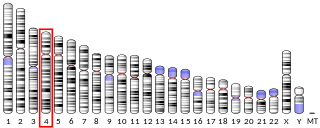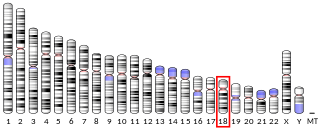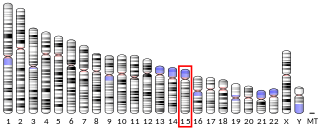
Ninein is a protein that in humans is encoded by the NIN gene. Ninein, together with its paralog Ninein-like protein is one of the proteins important for centrosomal function. This protein is important for positioning and anchoring the microtubules minus-ends in epithelial cells. Localization of this protein to the centrosome requires three leucine zippers in the central coiled-coil domain. Multiple alternatively spliced transcript variants that encode different isoforms have been reported.

Centrosomal protein of 290 kDa is a protein that in humans is encoded by the CEP290 gene. CEP290 is located on the Q arm of chromosome 12.

Centrosome-associated protein 350 is a protein that in humans is encoded by the CEP350 gene.

PHD finger protein 3 is a protein that in humans is encoded by the PHF3 gene.

Centrosomal protein of 55 kDa is a protein that in humans is encoded by the CEP55 gene.

Centrosome-associated protein CEP250 is a protein that in humans is encoded by the CEP250 gene. This gene encodes a core centrosomal protein required for centriole-centriole cohesion during interphase of the cell cycle. The encoded protein dissociates from the centrosomes when parental centrioles separate at the beginning of mitosis. The protein associates with and is phosphorylated by NIMA-related kinase 2, which is also associated with the centrosome. Furthermore, CEP135 is also required for the centriolar localization of CEP250.

Centrosomal protein of 68 kDa is a protein that in humans is encoded by the CEP68 gene. CEP68 is required for centrosome cohesion. It decorates fibres emanating from the proximal ends of centrioles. During mitosis, CEP68 dissociates from centrosomes. CEP68 and rootletin depend both on each other for centriole association, and both also require CEP250 for their function.

IQ calmodulin-binding motif-containing protein 1 is a protein that in humans is encoded by the IQCB1 gene.

Secernin-1 is a protein that in humans is encoded by the SCRN1 gene.

Uncharacterized protein KIAA1377 is a protein that in humans is encoded by the KIAA1377 gene. Also known as Cep126, the protein has been shown to localize to the centrosome. Furthermore, it is found at pericentriolar satellites and the base of the primary cilium. Depleting Cep126 leads to dispersion of pericentriolar satellites, in turn disrupting microtubule organization at the mitotic spindle.

Centrosomal protein of 57 kDa is a protein that in humans is encoded by the CEP57 gene. It is also known as translokin.

Centriolar coiled-coil protein of 110 kDa also known as centrosomal protein of 110 kDa or CP110 is a protein that in humans is encoded by the CCP110 gene. It is a cell cycle-dependent CDK substrate and regulates centrosome duplication. CP110 suppresses a cilia assembly program.

Ninein-like protein is a protein that in humans is encoded by the NINL gene. It is part of the centrosome.

Centrosomal protein of 70 kDa is a protein that in humans is encoded by the CEP70 gene. The protein interacts with γ-tubulin through its coiled coil domains to localize at the centrosome. CEP70 is involved in organizing microtubules in interphase cells and is required for proper organization and orientation of the mitotic spindle.

Centrosomal protein of 135 kDa is a protein that in humans is encoded by the CEP135 gene. It is part of the centrosome throughout the cell cycle, being distributed in the pericentriolar material. CEP135 is required for the centriolar localization of CEP250.

Rootletin also known as ciliary rootlet coiled-coil protein (CROCC) is a protein that in humans is encoded by the CROCC gene. Rootletin is a component of the ciliary rootlet, and, together with CEP68 and CEP250, is required for centrosome cohesion.

Centrosomal protein of 192 kDa, also known as Cep192, is a protein that in humans is encoded by the CEP192 gene. It is the homolog of the C. elegans and D. melanogaster gene SPD-2.

Centrosomal protein of 164 kDa, also known as CEP164, is a protein that in humans is encoded by the CEP164 gene. Its function appears two be twofold: CEP164 is required for primary cilium formation. Furthermore, it is an important component in the response to DNA damage by UV light.

Centrosomal protein of 76 kDa, also known as CEP76, is a protein that in humans is encoded by the CEP76 gene.

Centrosomal protein of 152 kDa, also known as Cep152, is a protein that in humans is encoded by the CEP152 gene. It is the ortholog of the Drosophila melanogaster gene asterless (asl) and both are required for centriole duplication.



















